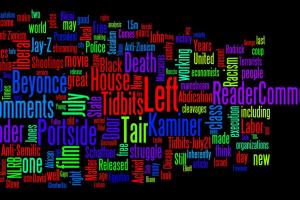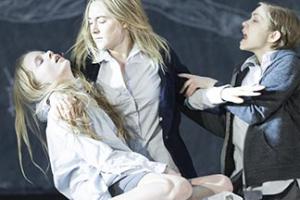Hillary Clinton Was Politically Incorrect, but She Wasn't Wrong About Trump's Supporters
The Atlantic
 Breaking with historic tradition, both Clinton and Trump do no allow reporters to travel with them. This is about something much bigger than eyewitness accounts and plane rides. It's about how much we want to know about each candidate's plans for the White House, and how open and accessible we want them to be as president. And ultimately, it's about whether we truly believe in the premise that transparency is vital for democracy.
Breaking with historic tradition, both Clinton and Trump do no allow reporters to travel with them. This is about something much bigger than eyewitness accounts and plane rides. It's about how much we want to know about each candidate's plans for the White House, and how open and accessible we want them to be as president. And ultimately, it's about whether we truly believe in the premise that transparency is vital for democracy.
 Between 1846 and 1873, California's Indian population plunged by some 80 percent. The book painstakingly recapitulates the systematic homicidal culling of the state's native American tribes . While not the final word on the ubiquity of the term genocide worldwide, it establishes that murder was the preferred and accepted method of social control for white settlers, gold miners. state militias and federal policy makers. The long-term consequences were staggering.
Between 1846 and 1873, California's Indian population plunged by some 80 percent. The book painstakingly recapitulates the systematic homicidal culling of the state's native American tribes . While not the final word on the ubiquity of the term genocide worldwide, it establishes that murder was the preferred and accepted method of social control for white settlers, gold miners. state militias and federal policy makers. The long-term consequences were staggering.
 Defining a social justice agenda primarily in reaction to Clinton (oppose her, back her), or Trump (fight him, ignore him), allows the dominant two-party system to set the tone, reduces independent politics to slogans without substance. Failure to look at the whole political environment rather than any one aspect of it, has led to lost opportunities in the past.
Defining a social justice agenda primarily in reaction to Clinton (oppose her, back her), or Trump (fight him, ignore him), allows the dominant two-party system to set the tone, reduces independent politics to slogans without substance. Failure to look at the whole political environment rather than any one aspect of it, has led to lost opportunities in the past.
 Reader Comments: Tair Kaminer Released; Racism in Police Shootings; NLRB Become as More Activist than Labor?; Socialism Comes to Philadelphia; Portside readers have differing views on both the Abdication of the Left and the movie, the Free State of Jones; United States-Land of Terrorists and Massacres; Is Anti-Zionism Inherently Anti-Semitic?; Jay-Z and Beyoncé are donating $1.5m to Black Lives Matter
Reader Comments: Tair Kaminer Released; Racism in Police Shootings; NLRB Become as More Activist than Labor?; Socialism Comes to Philadelphia; Portside readers have differing views on both the Abdication of the Left and the movie, the Free State of Jones; United States-Land of Terrorists and Massacres; Is Anti-Zionism Inherently Anti-Semitic?; Jay-Z and Beyoncé are donating $1.5m to Black Lives Matter
 Between 1968 and 1973, the two governments concealed the expulsion from the world. If anyone asked, Anglo-American officials decided to “maintain the fiction that the inhabitants of Chagos” were “transient contract workers,” as one bureaucrat explained. A British official called the Chagossians “Tarzans” and “Man Fridays,” in a tellingly racist reference to Robinson Crusoe.
Between 1968 and 1973, the two governments concealed the expulsion from the world. If anyone asked, Anglo-American officials decided to “maintain the fiction that the inhabitants of Chagos” were “transient contract workers,” as one bureaucrat explained. A British official called the Chagossians “Tarzans” and “Man Fridays,” in a tellingly racist reference to Robinson Crusoe.
 The timeliness of The Butler's Child has just been demonstrated by the death of a black man in Baton Rouge at the hands of two ill trained young white police officers. Fifty years ago Steel thought of the Deep South as a dangerous and racist place. Today, however, it has become clear that racism and trigger-happy cops are national phenomena.
The timeliness of The Butler's Child has just been demonstrated by the death of a black man in Baton Rouge at the hands of two ill trained young white police officers. Fifty years ago Steel thought of the Deep South as a dangerous and racist place. Today, however, it has become clear that racism and trigger-happy cops are national phenomena.
 A crucible is a pot in which metals or other substances are heated to a very high temperature or melted. Miller's story is about events that took place in Salem, Massachusetts in 1692. But it's really about the House Un-American Activities Committee (HUAC), America's thought police of the early 50s, which burned through American rights and professed values. It's the best play of the season.(Closes July 17, 2016)
A crucible is a pot in which metals or other substances are heated to a very high temperature or melted. Miller's story is about events that took place in Salem, Massachusetts in 1692. But it's really about the House Un-American Activities Committee (HUAC), America's thought police of the early 50s, which burned through American rights and professed values. It's the best play of the season.(Closes July 17, 2016)
Spread the word